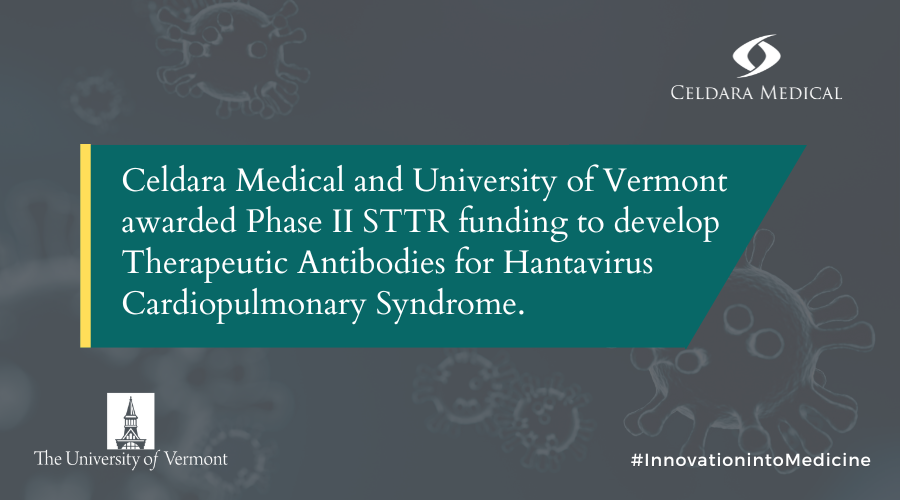
Lebanon, NH: National Institute of Allergy and Infectious Diseases (NIAID) of the National Institutes of Health (NIH) has awarded a Phase II Small Business Technology Transfer (STTR) grant to fund the ongoing development of therapeutic antibodies for the treatment of Hantavirus Cardiopulmonary Syndrome (HCPS). The funding will support the ongoing development of therapeutic antibodies for the treatment of HCS and the continued collaboration between Celdara Medical and Dr. Jason Botten, Professor of Medicine at the University of Vermont (UVM), and Scientific Founder at Celdara Medical and Principal Investigator.
HCPS is a severe and often fatal respiratory disease caused by Hantavirus. Dozens of Hantavirus species have been identified across the Americas, Europe, and Asia. There are currently no approved treatments for HCPS, and the mortality rate can be as high as 40%. Celdara Medical aims to address this critical unmet need by developing novel antibodies that target hantaviruses and prevent them from causing severe respiratory illness.

This project builds upon the discoveries of Dr. Botten, whose research focuses on understanding the immune response to viral infections and developing new therapeutics based on key virus-host interactions. The research conducted by Dr. Botten and his team has been instrumental in the ongoing development of HCPS therapeutic antibodies at Celdara Medical.
“I began my career studying hantavirus disease shortly after the initial outbreaks of disease in the Americas in the 1990s,” said Dr. Botten. “The extreme lethality of these viruses was terrifying at that time, particularly because there were no effective medicines or treatments. Nearly 30 years later, we still lack these essential countermeasures to prevent or treat this disease. I’m extremely grateful to the NIH for this opportunity to develop a potential frontline treatment for this deadly disease,” he added.
“We are very thankful to receive this Phase II STTR funding from the NIAID to advance our work on Hantavirus Cardiopulmonary Syndrome,” said Dr. Jake Reder, Co-founder and Chief Executive Officer of Celdara Medical. “Despite high case fatality rates, there is vanishingly little therapeutic development activity. Thanks to NIAID prioritization of these threats, we’re able to advance some very promising preclinical molecules towards the clinic and move closer to our goal of providing effective treatments for patients suffering from this devastating disease.”
Dr. Joana Murad Mabaera, Executive Director of Research and Development at Celdara Medical and Principal Investigator remarked, “Hantaviruses are rodent-borne viruses that cause highly lethal disease in humans, and no approved drugs or vaccines exist to treat or prevent the infection. With this funding, we expect to develop a potent neutralizing monoclonal antibody, isolated from acutely infected patients, that can become a first-line antiviral for the treatment or prevention of HCPS. With this funding, we are one step closer to bringing hope to patients and their families who are affected by this disease.”
Research reported in this press release is supported by the National Institute of Allergy and Infectious Diseases of the National Institutes of Health under award number R42AI132047-03. The content is solely the responsibility of Celdara Medical and UVM and does not necessarily represent the official views of the National Institutes of Health.
About Celdara Medical, LLC
Celdara Medical was founded by Drs. Jake Reder and Michael Fanger in 2008 and is headquartered at the Dartmouth Regional Technology Center (DRTC) in Lebanon, NH. Celdara Medical builds academic and early-stage innovations into high-potential medical companies, identifying discoveries of exceptional value at the earliest stages and moving them toward the market. Celdara Medical partners with inventors and their institutions, providing the developmental, financial, and business acumen required to bridge discovery and profitability. With robust funding options, a diverse and high impact Programmatic pipeline, and partnerships with world-class academic institutions and industry leaders, Celdara Medical navigates all aspects of a complex industry, accelerating science to improve human health. Further information about Celdara Medical is available at celdaramedical.com.